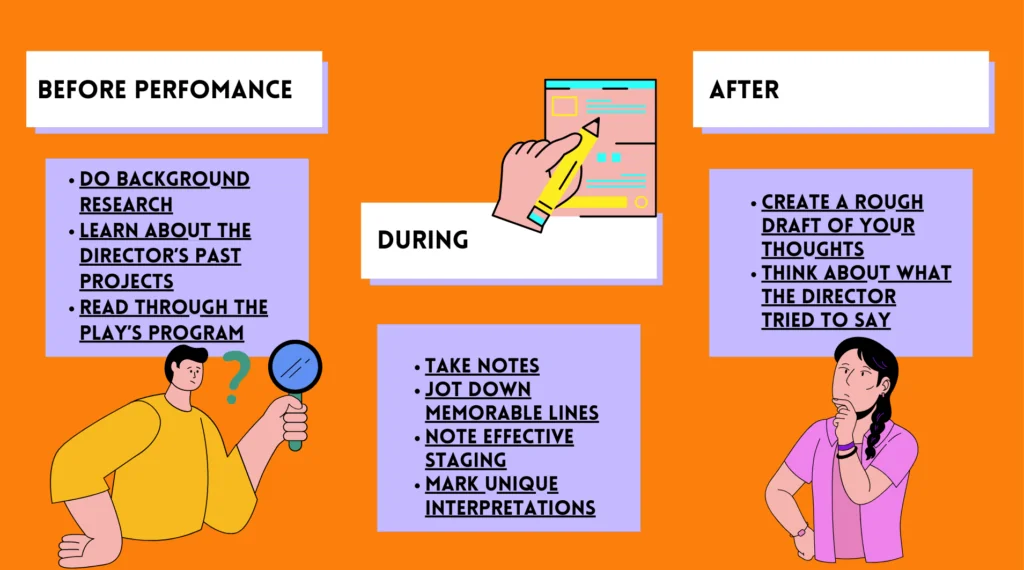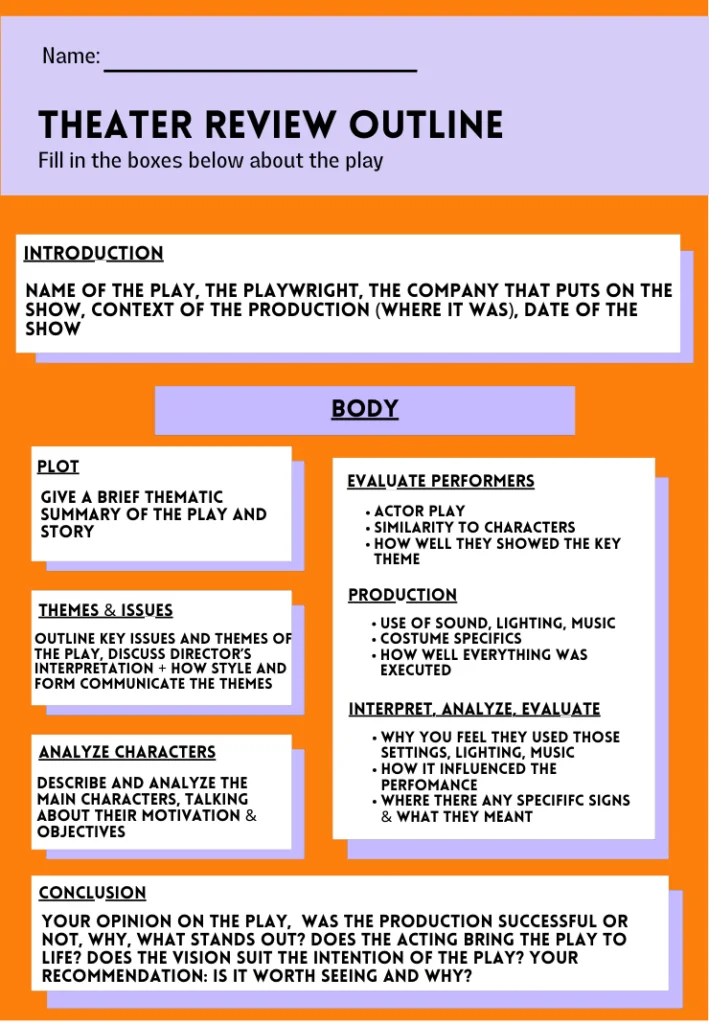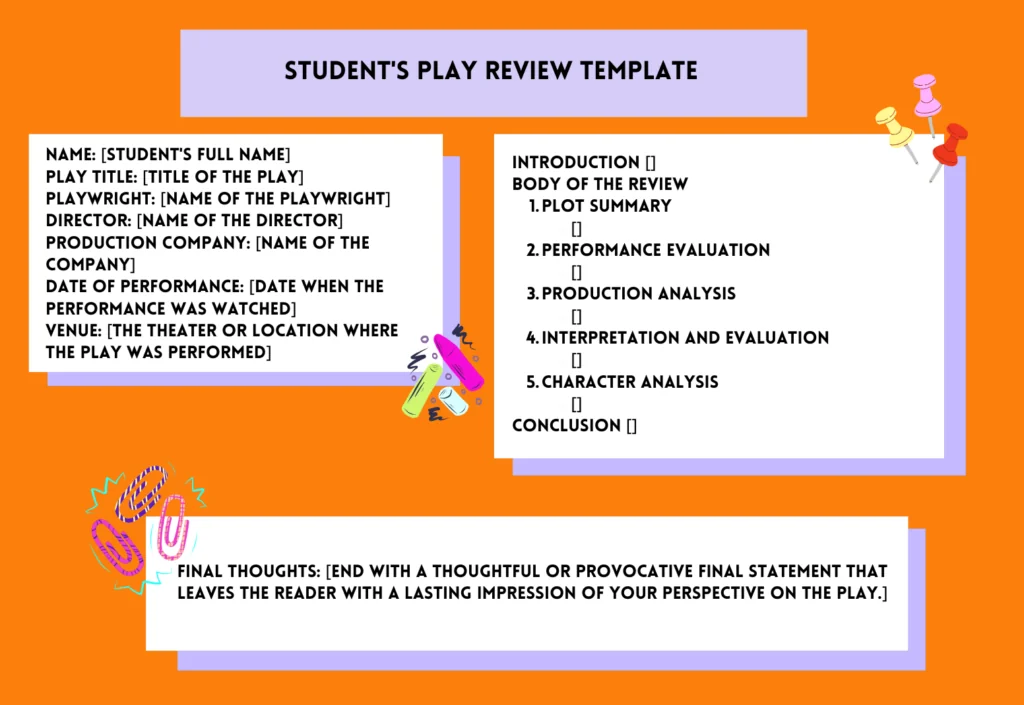

by Lesley J. Vos
8 min read 0 commentsDespite the vast popularity of short content (quick videos and TV series broken down into small episodes), theater is still not dead and plays attract as many viewers as before. Soi, if you thought that writing a play review was a thing of the past already, you were largely mistaken. But why would someone need to write a review for a theatrical play? For starters, to inform the potential audience about what they are going to pay money for; whether a play does or does not contain controversial scenes; or whether it is worth attending, at least. Your goal as a reviewer is to give the audience an accurate opinion of the play and to provide them with a context regarding it: actors, decorations, the director, dialogues, the script, and so on.
JOIN OUR LEARNING HUB
✅ AI Essay Writer ✅ AI Detector ✅ Plagchecker ✅ Paraphraser
✅ Summarizer ✅ Citation Generator
We get that you are eager to start writing, however, the preparation is equally as important as the writing process itself. Moreover, there are a few things you should consider even before watching the play, that can help you organize your writing process more effectively.
First of all, you need to note the key details: the name of the show, its director, costume designer, and writer. You can find all of this online or by looking at the brochure which can usually easily be found at the theater. Now, we suggest you take a small notebook with you (as phones are not allowed to be used during the play) where you can jot down the answers to the following questions regarding the show:
These are just the major questions that you can answer either as you are watching the play or after the show. Additionally, if you read the script before going to the theater, you can also compare the performance with the written text. In this case, you will need to touch upon a) whether the production realized the full potential of the script, and b) whether the actors fit into the character description you had in mind.

We told you what you need to concentrate on when watching the play, but in reality, the research you do beforehand is also highly important. A bit of background research can help you understand the show much better without clouding your judgment. Try to learn a bit about the theater company and the director’s past projects, if available. When you arrive, take a moment to read through the play’s program—look for the director’s note and the cast biographies, which can shed light on the creative choices behind the production.
During the performance, let your immediate reactions guide your note-taking. Jot down memorable lines, effective staging, and any unique interpretations that stand out. Try to stay present and engaged, though, so make sure to balance your noting with simply enjoying the show. The intermission is a great time to catch up on your notes without missing any part of the action.
After the curtain falls, quickly organize your thoughts into a rough draft. Verify all the factual details, like names and plot points, so that everything is accurate. Think about whether the director brought new insights. Reflect on the context and the choices made in the production. For example, a modern twist on a classic play can shift its themes and dynamics. Discussing these choices will help you deepen your analysis and engage your readers by showing them new ways to think about familiar works.
Finally, approach your review with both a critical eye and a sense of fairness. Consider not just what was presented and how, but why the director and designers made those choices. What were they trying to communicate? Were they successful? Engaging with these questions will make your review both thorough and thoughtful, providing your readers with a rich perspective on the performance.
The first step you need to take is to outline the structure. Of course, as with all the major types of writing this one will also have an introduction, body paragraphs, and conclusion. Nonetheless, in the case of a play review, there are also a few other structural aspects that need to be included.
As you can see from the picture, there are a lot of nuances that you should consider when thinking of writing a play review. So, as we now know what to pay attention to, we can proceed to writing.

As you can see from the picture, there are a lot of nuances that you should consider when thinking of writing a play review. So, as we now know what to pay attention to, we can proceed to writing.
First impressions matter. Your introduction is where you’ll present the essential details: the play’s title, the playwright, the production company, and the historical context, if relevant. It’s also where you’ll set out your thesis—your overarching impression of the play’s execution. Remember, your initial thoughts may not align with the director’s vision, but that’s the beauty of art—it’s subjective.
Now, state the essence of the play without giving away the plot. Use this part to underline the thematic heartbeat of the story, supporting your insights with evidence (maybe some lines that you noted when watching). You can snugly fit this into your introduction or let it be a bit more detailed in a standalone paragraph.
It’s time to get into the details. Piece together each clue—the actors’ silent dialogue, the set’s subtle whispers, and how they relate to your initial thoughts. Why did they choose to add those decorations and lighting? How does all of this contribute to the general theme? You need to present your analytical skills in all their beauty, not skipping on any important details.
Talking About Performances
Here’s where you get to shine. Break down the performances—were the actors convincing? Did the storyline keep you glued or had you scrolling through your mental grocery list? Remember, your voice matters. Your unique viewpoint could be the refreshing take someone needs to see the play through a new lens.
At the end, circle back to that opening act—your thesis. Reflect on whether the play lived up to your expectations or left you wanting more. You can also provide your recommendation as to whether the place is worth seeing at all and why. And then, leave a little sparkle behind—a final thought for your readers to remember long after they’ve left your page.
As we settled down on the initial steps you need to take to go through with writing a theater review, we feel it’s important that we tell you what NOT to do during this process. Because there are a few mistakes that can affect the quality of your work and the time you spend finishing it.
Common Mistakes When Writing a Play Review
– Focusing on just one or two aspects of the play (positive or negative) when writing a review, omitting everything else.
– Watching a play once, and rushing to write a review without fully understanding the plot and the artistic techniques used in it.
– Not gathering information relevant to the play before watching it, and thus not engaging in the context, without which it may be more difficult to evaluate the play objectively.
We decided to help you out a little bit and give you a play review template, so you have a better idea of what a final writing should look like. As we don’t want to take much of your time, we made it as concise as possible, yet included all the necessary parts and information.

A play review typically includes several key components that together provide a complete analysis of the production. It starts with an introduction that sets the stage by introducing the play, its author, and the key production details. The body of the review should have a detailed description of the performance, including discussions of the acting, direction, set design, costumes, lighting, and sound. It’s also important to include a critical analysis section, where you dig into the themes, messages, and emotional impact of the play. Finally, the conclusion summarizes your overall impression and provides a recommendation for potential audiences.
Writing a critique of a play asks for a thoughtful evaluation of its various artistic elements. Begin by describing the setting, plot, and characters to give readers a sense of the production. Discuss the performances of the actors, the direction, and the technical aspects like costumes and lighting. Analyze how these elements contribute to or detract from the play’s overall effectiveness. Support your opinions with specific examples from the performance. Conclude by summarizing your thoughts and stating whether you recommend the play, providing reasons for your judgment.
To rate a play, consider several factors such as the quality of the script, performances, direction, and technical execution. Think about the emotional and intellectual impact of the play on you and the audience around you. Ratings can be numerical or descriptive, but they should always be backed up by a detailed explanation of your assessment. It’s helpful to consider both the strengths and weaknesses of the production objectively and to compare them to standard expectations of theater to provide a balanced rating.
The three rules of critique are: be honest, be fair, and be constructive. Honesty requires you to express your true impression of the work, while fairness means acknowledging the efforts of the creators and performers and considering the artistic choices made. Being constructive involves offering criticism that is useful and intended to improve understanding or encourage reflection, rather than merely pointing out flaws without context or suggestion for improvement.
A formal analysis of a play is a detailed examination of its structural elements—like plot, themes, dialogue, pacing, and character development—and how these contribute to the overall impact of the play. This type of analysis looks at the mechanics of the playwriting and staging, assessing how the narrative is constructed and delivered. It considers how the elements of drama—such as tension, climax, and resolution—are handled and the effectiveness of the play’s structure in conveying its message or artistic intent. Formal analysis helps deepen understanding of the play’s artistic value and how it communicates with its audience.
Opt out or Contact us anytime. See our Privacy NoticeFollow us on Reddit for more insights and updates.
Welcome to A*Help comments!
We’re all about debate and discussion at A*Help.
We value the diverse opinions of users, so you may find points of view that you don’t agree with. And that’s cool. However, there are certain things we’re not OK with: attempts to manipulate our data in any way, for example, or the posting of discriminative, offensive, hateful, or disparaging material.